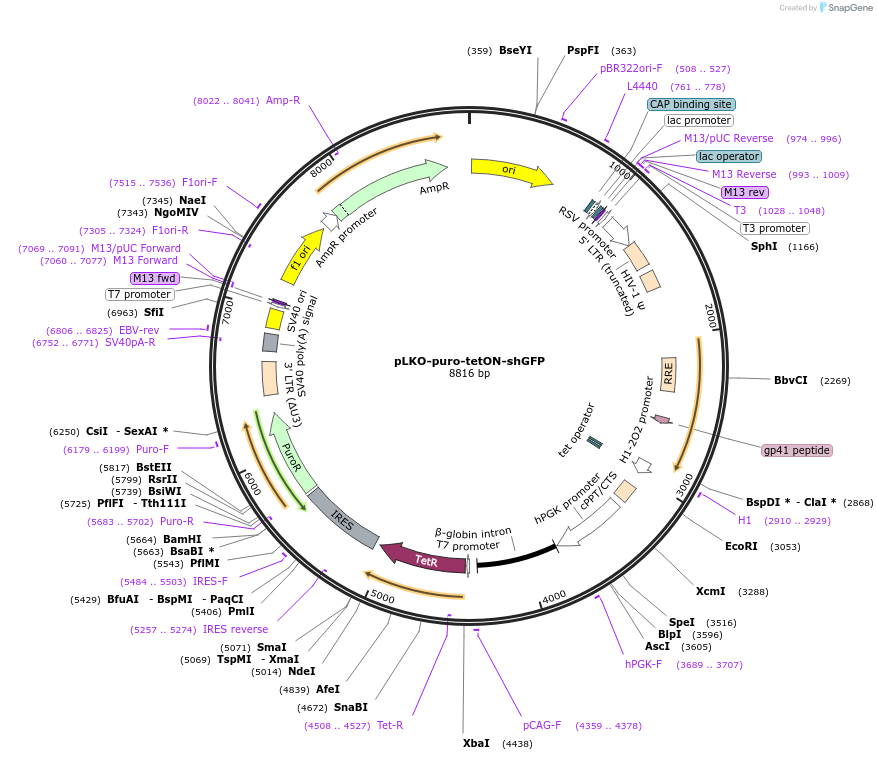pLKO-puro-tetON-shGFP
(Plasmid
#110939)
-
PurposeTet-inducible shRNA targeting GFP
-
Depositing Lab
-
Sequence Information
Ordering
| Item | Catalog # | Description | Quantity | Price (USD) | |
|---|---|---|---|---|---|
| Plasmid | 110939 | Standard format: Plasmid sent in bacteria as agar stab | 1 | $85 | |
Backbone
-
Vector backboneTet-pLKO-puro
-
Backbone manufacturerDmitri Wiederschain
- Backbone size w/o insert (bp) 10633
-
Vector typeLentiviral, RNAi
-
Selectable markersPuromycin
Growth in Bacteria
-
Bacterial Resistance(s)Ampicillin, 100 μg/mL
-
Growth Temperature30°C
-
Growth Strain(s)NEB Stable
-
Copy numberUnknown
Gene/Insert
-
Gene/Insert nameshGFP
-
gRNA/shRNA sequenceCAACAGCCACAACGTCTATAT
-
GenBank ID
- Promoter H1/TO
Cloning Information
- Cloning method Restriction Enzyme
- 5′ cloning site AgeI (unknown if destroyed)
- 3′ cloning site EcoRI (unknown if destroyed)
- 5′ sequencing primer GGCAGGGATATTCACCATTATCGTTTCAGA (Common Sequencing Primers)
Resource Information
-
Supplemental Documents
Terms and Licenses
-
Academic/Nonprofit Terms
-
Industry Terms
- Not Available to Industry
Trademarks:
- Zeocin® is an InvivoGen trademark.
Depositor Comments
Recombination can be minimized by using NEB Stable E. coli strain grown at 30C to amplify the plasmid DNA. Even so, low recombination rate may still happen and when you eventually amplify the DNA you may need to screen through several colonies and perform diagnostic digests to identify the correct ones.
These plasmids were created by your colleagues. Please acknowledge the Principal Investigator, cite the article in which the plasmids were described, and include Addgene in the Materials and Methods of your future publications.
-
For your Materials & Methods section:
pLKO-puro-tetON-shGFP was a gift from William Hahn (Addgene plasmid # 110939 ; http://n2t.net/addgene:110939 ; RRID:Addgene_110939) -
For your References section:
PIK3CA mutant tumors depend on oxoglutarate dehydrogenase. Ilic N, Birsoy K, Aguirre AJ, Kory N, Pacold ME, Singh S, Moody SE, DeAngelo JD, Spardy NA, Freinkman E, Weir BA, Tsherniak A, Cowley GS, Root DE, Asara JM, Vazquez F, Widlund HR, Sabatini DM, Hahn WC. Proc Natl Acad Sci U S A. 2017 Apr 25;114(17):E3434-E3443. doi: 10.1073/pnas.1617922114. Epub 2017 Apr 10. 10.1073/pnas.1617922114 PubMed 28396387

